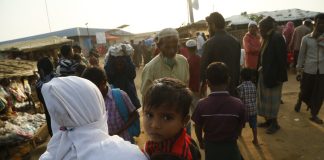The Rohingya refugee crisis stands as one of the most pressing humanitarian challenges in recent times. Escaping persecution and violence in Myanmar, hundreds of thousands of Rohingya Muslims sought refuge in neighbouring Bangladesh. The makeshift refugee camps in Cox’s Bazar have become home to this marginalised community, grappling with overcrowding, lack of basic amenities, and limited access to healthcare and education.
In the UK, the Rohingya diaspora has also played a significant role in raising awareness about the crisis. They have advocated for international attention, aid, and justice for their fellow Rohingya community still trapped in Myanmar.

Image: Deen Mohammad Noori
Deen Mohammad Noori, a resident of Bradford, and president of Arakan Rohingya Organisation UK (AROUK), is only a part of this diaspora.
Having moved to Bradford in 2010, from Bangladesh, Deen faced a tough life back in the refugee camps in Bangladesh.
“I saw a genocide in Myanmar in 1992, and then I had a journey to Bangladesh along with my parents when I was seven years old. We had to live in refugee camps in Bangladesh for many years. There were limitations on rights, the refugees did not have any free movement, nor freedom of speech. They have been living in refugee camps for many years now, since 1992, without any human rights. They have been kept as if they are confiscated.
“The International community, along with United Nations, especially European countries, decided to settle some of the refugees from Bangladesh. It was then, I was chosen to be here (in the UK), so I moved to the UK.”
Being in an all-new country was initially challenging for Rohingya refugees like Deen.
“To be honest, it was very challenging for us, especially when we did not have any belongingness to any country or nationality. Without any identity, without any nationality, no one would recognise us. It’s like, if you do not have a name, who would know you? No one. We were in the same position, no one recognised us.
“Gradually, we got all the rights. I got the right to study, I got to the right to do anything, according to the UK’s regulation.
“When I came to the UK, it was a life changing moment for us, not just for me, but for everybody who came along with me.”
UK has resettled multiple Rohingya refugees, helping them escape the crisis. Bradford has been a safe home for them since long.

Image: Deen Mohammed Noori
Deen tells Asian Standard, when he came to the UK, there were 350 to 400 Rohingya refugees in Bradford. “The number,” he says, “has gone up to approximately 600 to 700 now.”
The AROUK president is among many refugees who has been waiting for the arrival of their loved ones to UK, from Bangladesh. News reports from 2017, state that the Rohingya community in UK, had made an appeal to the international community, to help the refugees in Bangladesh find a new home.
He told Asian Standard, “There has been no update, obviously I have to go through all the Government procedures if I have to help them. I cannot do anything on my own. I can’t bring them the way I want.
“The way I came to UK, in the same way, I wanted to bring my parents, my brother, and my sister. My parents are really old, and they have got no one there to look after them. That’s why I tried to bring them over here, but I couldn’t get any help from the Government.
“I am still trying; I am trying to contact UNHCR in London and I am also trying to contact the concerned authorities in Bangladesh. I am doing all I can.
“When we came to UK, from Bangladesh, we had asked the authorities, what about our loved ones, we were told that they too would soon come. But we have still been waiting.
“Almost all people in the Rohingya community in the UK, are looking forward to bringing back a loved one from Bangladesh”.
Deen Mohammed Noori is also a president of an organisation called Arakan Rohingya Organisation UK.
“Our mission is very simple,” Deen says.
“We try to bring our community together; we try to help them with any kind of assistance with the Government. We train them, we educate them. We support them to ensure that they have a good life and stay peacefully.”
Making an appeal for support, Deen says, “We have been facing a genocide since 1962, so I request everyone to please support the Rohingya community, help them get the right facilities, so that they can lead a good life. If I had been living in Bangladesh, I wouldn’t be anything, but now, after getting support, I am leading a good life. My daughter gets a good education. So, I would just appeal to everyone to help out, if possible, spread awareness and help us lead a good life.”




